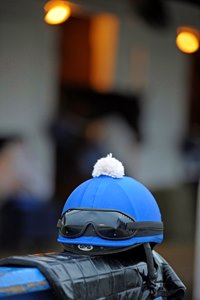CHRB Advances Jockey Suspension Proposal


The California Horse Racing Board Aug. 24 advanced a proposal that would set minimum jockey suspension guidelines for careless riding infractions in the state.
During its regular monthly meeting at Del Mar Thursday, the CHRB sent the proposal—which, if eventually approved, would set a jockey's minimum suspension for violating the state's riding rules at two racing days—out for a 45-day public-comment period.
Currently there is not a minimum suspension guideline within CHRB regulations, which gives the state's stewards a wide range of enforcement options, but three days has become the minimum suspension in practice.
Barry Broad, who represented the Jockeys' Guild at the CHRB session, made an economic case for a two-day minimum suspension.
"With fewer racing days in the last decade and shorter fields, these suspensions for minor infractions have become a major economic burden," Broad said. "In other words the relative punishment has increased from what it was. ... Even though it may not seem like a lot of days, if it's your whole week, it's a week. ... If it's two weeks in a 60-day period, that's a lot of income. There have been some situations where some jockeys have gotten to the point where they want to apply for a hardship (exemption to draw from their) pension plan so they can pay their mortgage."
Even though he acknowledged he was likely opening a can of worms, Broad also mentioned, when a jockey is suspended but still working out horses in the morning, the rider is essentially doing work without any compensation.
"Despite the fact that the horse racing law requires that jockeys be paid to ride horses in the morning if they are not engaged to ride that horse in the race, that rule has never been enforced. ... And I'm not asking necessarily to change it, because I don't want to start anything here, despite the fact that there is a lot of pressure from trainers to work those horses," Broad said. "That includes on days they have a suspension, which means they're working for free on a day they can't earn any income. Frankly, that's just not fair.
"It's contrary to the law and it's not fair. ... I'm talking reality here. None of them are going to complain. None of them are going to say anything, because they're going to worry they're not going to get mounts. I hate to bring up that kind of thing, but ... you need to know that. And that's part of this calculation."
CHRB chief steward Darrel McHargue countered that the minimum suspension should be three days to deter reckless riding. McHargue said, at a recent Stewards Committee meeting, it was decided with an 8-4 vote that the recommended minimum suspension should be three days.
"When you lessen the penalty for a routine careless riding suspension, you lessen the deterrent for a jockey," McHargue said.
Although multiple CHRB members pointed out a two-day minimum suspension would allow for longer suspensions if warranted, McHargue said, "When you set a minimum, it becomes the standard."
CHRB member Madeline Auerbach noted that jockey suspensions also have an impact on owners. Auerbach, CHRB chairman Chuck Winner, and vice chairman George Krikorian are all owners.
"The one thing I haven't heard is that there's a lot of investment that the owners have, not only in the horses ... but they also have investments in the jockeys," Auerbach said. "When you are looking at a condition book and you have a certain rider and your rider makes a mistake and gets days ... it's not just the effect that it has on the jockey. It's the effect that it has on the ownership. ... You get penalized too when you're not part of the problem or part of the solution."
Chantal Sutherland was the only active jockey to speak in front of the board—although CHRB member Alex Solis is an active jockey—and brought up the economic impact of suspensions on jockeys who may not be able to rely on designated stakes races, which are exempt from suspensions.
"The percentage of jockeys who are riding (in) designated races is probably 5%. ... When it's three days (on first offense) and five days (on second offense), it's tough," Sutherland said. "It's really tough to not work for a whole week. ... From a jockey's standpoint, I'm scraping by—barely breaking even. It's tough for us and we're moving around, and it's not cheap living in California. It's making some of the jockeys think, 'Maybe we've got to go somewhere else. This isn't the place to ride. You can't afford to do it.'"
